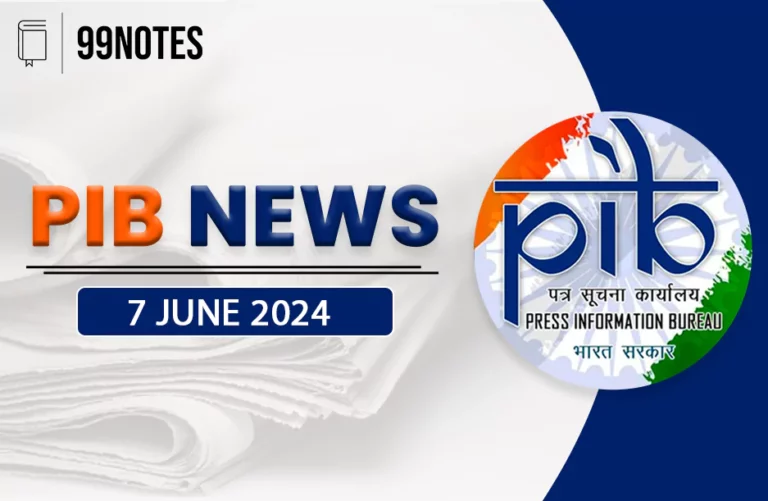20 Dec 2023 : PIB
PRESS INFORMATION BUREAU
20-December -2023
1. Soil Health Management and Soil Health Card Schemes
| Topic: GS2 – Governance – Interventions for development in various sectors Critical for UPSC: India’s Soil Health Card Scheme integration with RKVY enhances sustainable agriculture, impacting millions through informed soil management. |
| Context: |
|
- Initiative Name: Soil Health Management & Soil Health Card Schemes
- Implemented by: Government of India
- Initiated Since: 2014-15
- Under the National Project: National Mission for Sustainable Agriculture
- Integration: Merged as Soil Health & Fertility component of Rashtriya Krishi Vikas Yojana (RKVY)
- Objective: Provide farmers with information on the nutrient status of their soil and recommend appropriate dosage of nutrients for improved soil health and productivity.
Achievements:
- Soil Health Cards Distributed:58 crore
- Implementation Scheme: Guidelines issued for the Soil Health & Fertility component of RKVY
- Training and Demonstrations:
- Farmer’s Trainings: 93,781 conducted
- Demonstrations: 6.45 lakh organized
- Farmer’s Melas/Campaigns: 7,425 held
- Focus Areas of Training:
- Judicious use of chemical fertilizers
- Integration of secondary and micronutrients
- Combined use with organic manures & bio-fertilizers
- Awareness Creation: Trainings and demonstrations conducted to raise awareness among farmers.
- Geographic Coverage: Activities organized across the country.
| PYQ: How and to what extent would micro-irrigation help in solving India’s water crisis?(UPSC CSE (M) GS-3 2021) (150 words/10 m) |
| Practice Question: Practice Question: Critically analyze the objectives and potential benefits of the Soil Health Card Scheme launched by the Government of India. Discuss the challenges in its implementation and suggest measures to overcome them. (250 words/15 m) |
2. Report on Farmers’ Income
| Topic: GS3 – Indian Agriculture – Doubling Farmers Income. UPSC Significance: Examines strategies for doubling farmers’ income, budget allocation growth, and successful implementation of key agricultural policies. |
| Context: |
|
Inter-Ministerial Committee (2016):
- Examined the “Doubling of Farmers Income (DFI)” and recommended strategies.
- Submitted its final report in September 2018 with various policies, reforms, and programs.
- Seven Sources of Income Growth:
- Increase in crop productivity
- Increase in livestock productivity
- Resource use efficiency – reduction in cost of production
- Increase in cropping intensity
- Diversification to high value agriculture
- Remunerative prices on farmers’ produce
- Shift of surplus manpower from farm to non-farm occupations
- Budget Allocation Growth (2013-14 to 2023-24):
- Despite the separation of ministries, the total budget allocation for the Ministry of Agriculture and Farmers Welfare increased significantly from Rs. 30,223.88 crore to Rs. 1,25,035.79 crore.
Key Policies and Schemes:
- Implemented several policies and schemes, including PM KISAN, PMFBY, MSP, organic farming, Per Drop More Crop, FPOs, NBHM, e-NAM, AIF, Kisan Rail, MIDH, start-up ecosystem, and agri exports.
Success Results:
- Implementation of these schemes has yielded remarkable results towards augmenting the income of the farmers.
| Doubling Farmers Income |
Challenges:
Way forward:
|
| PYQ: What do you mean by the Minimum Support Price (MSP)? How will MSP rescue the farmers from the low-income trap? (UPSC CSE (M) GS-3 2018) (150 words/15 m) |
| Practice Question: Critically analyze the potential of digital and sustainable agricultural practices in achieving the goal of doubling farmers’ income in India. Discuss the challenges and suggest strategies to overcome them. (250 words/15 m) |
3. World’s Largest Grain Storage Plan
| Topic: GS3 – Agriculture – Food Security UPSC relevance: “Grain Storage Plan” addresses food security, farmer empowerment, and scheme convergence, vital for agricultural and economic policies. |
| Context: |
|
- Government Initiative: “World’s Largest Grain Storage Plan in Cooperative Sector” approved on 31.05.2023.
- Infrastructure Development: Involves creation of agri infrastructure at PACS level – decentralized godowns, custom hiring centers, processing units, Fair Price Shops.
- Convergence of Schemes: Utilizes existing government schemes like Agriculture Infrastructure Fund (AIF), Agricultural Marketing Infrastructure Scheme (AMI), Sub Mission on Agricultural Mechanization (SMAM), PMFME,
- Financial Support: PACS can avail subsidies, interest subvention, and NABARD’s highly subsidized refinancing for projects up to Rs. 2 Crore.
- Strengthening PACS: Aims to diversify PACS business activities, enhance revenue, and improve financial sustainability.
- Implementing Agencies: National Cooperative Development Corporation (NCDC), NABARD, FCI, CWC, NABCONS, NBCC, etc., involved in Pilot Project implementation.
- Accountability Mechanism: Inter-Ministerial Committee (IMC) and National Level Coordination Committee (NLCC) constituted for guideline modification and overall project steering.
- State-Level Committees: State Cooperative Development Committee (SCDC) and District Cooperative Development Committee (DCDC) monitor and integrate project at state and district levels.
- MoU for Collaboration: Signed between Ministry of Cooperation, Department of Food and Public Distribution, FCI, and NCDC for full capacity utilization.
- Targeted PACS: 1,711 PACS identified for storage capacity creation, with ongoing construction in 13 PACS across 13 States/UTs.
- Benefits to Farmers:
- Bridge finance and flexibility in selling produce.
- Access to agri inputs and services at Panchayat/village level.
- Additional sources of income through business diversification.
- Expanded market size and better value realization for produce.
- Food Security and Consumer Benefits: Ensures food security at Panchayat/village level, reducing post-harvest losses and benefiting consumers.
4. NEW SWARNIMA LOAN SCHEME
| Topic: GS2 – Social Justice – Welfare schemes for vulnerable sections
UPSC relevance: “New Swarnima Scheme” addresses women empowerment in backward classes, aligning with socio-economic inclusion and policy initiatives. |
| Context: |
|
- Scheme Name: New Swarnima Scheme for Women by NBCFDC.
- Objectives: Foster self-dependence in backward class women through term loans.
- Eligibility:
- Women from backward classes as per Central/State Govt notifications.
- Annual family income should be below Rs.3.00 Lakh.
- Salient Features:
- Targets women with annual family income below Rs.3.00 Lakh.
- No personal investment required for projects costing up to Rs.2,00,000/-
- Lower interest rates compared to general loan schemes.
For Enquiry

20 December 2023 : The Hindu Editorial Notes PDF

20 Dec 2023 : Daily Current Affairs

20 Dec 2023 : PIB

UNICEF Full Form: United Nations’ Child Protection Arm

IMF Full Form Explained: A Global Financial Institution

CRZ full Form and What it is? Complete detail about CRZ

19 Dec 2023 : Daily Quiz

Full Form of BRICS, History and it’s Importance for India

15th Finance Commission Recommendations Notes for UPSC

19 Dec 2023 : Daily Answer Writing
December 2023 The Hindu 20 December 2023 : The Hindu Editorial Notes PDF The Hindu Editorial
20-December-2023
1. The deep import of the Article 370 verdict.
Topic: GS2 – Indian…
Daily Current Affairs 20 Dec 2023 : Daily Current Affairs Daily Current Affairs
20-December-2023
1. Karnataka to reduce burden of school bags by 50%.
Topic:…
December 2023 Pib 20 Dec 2023 : PIB PRESS INFORMATION BUREAU
20-December -2023
1. Soil Health Management and Soil Health Card Schemes
Topic:…
Full Form UNICEF Full Form: United Nations’ Child Protection Arm UNICEF Full Form
The full form of UNICEF is the United Nations Children’s Fund. The United Nations International…
Full Form IMF Full Form Explained: A Global Financial Institution IMF Full Form
The full form of IMF is the International Monetary Fund. It was established as an international…
Full Form CRZ full Form and What it is? Complete detail about CRZ CRZ Full Form
Full form of CRZ is “Coastal Regulation Zone”. It deals with proper management and regulation…
Daily Quiz 19 Dec 2023 : Daily Quiz 19 Dec 2023 : Daily Quiz…
Full Form Full Form of BRICS, History and it’s Importance for India BRICS Full Form:
Full form of BRICS is Brazil, Russia, India , China , and South Africa. Initially it…
Articles 15th Finance Commission Recommendations Notes for UPSC The 15th Finance Commission was formed under the provisions of Article 280 to recommend the devolution…
mains answer writing 19 Dec 2023 : Daily Answer Writing Mains Answer Writing
19-December-2023
Q1) With help of a neat diagram, describe the general atmospheric…


